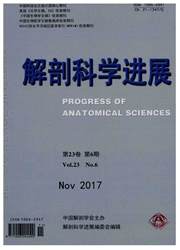

 中文摘要:
中文摘要:
目的研究不同剂量β淀粉样蛋白1-42片段(Aβ1-42)诱导的阿尔茨海默病(AD)小鼠模型的学习记忆功能的变化。方法在C57BL/6J小鼠双侧海马注射不同浓度的Aβ1-42各1μL诱导AD模型,并在对照组注射等量溶剂(生理盐水)。注射7天后,应用水迷宫(MWM)对小鼠进行学习和记忆功能的测定。结果与对照组相比,低剂量Aβ1-42(1μg/μL)处理对小鼠学习记忆功能未产生显著影响;而高剂量Aβ1-42(5μg/μL)处理组与对照组比较,潜伏期明显延长(P〈0.05)、周边活动时间百分比增加(〈0.05)、平台象限活动时间百分比减少(P〈0.05)、平台穿越次数减少(P〈0.05)。结论双侧海马注射5μg(5μg/μL,1μL)的Aβ1-42能够显著地影响小鼠的学习和记忆功能,是制备小鼠AD模型的有效方法。
 英文摘要:
英文摘要:
Objective To study the changes in learning and memorial behavior in Aβ 1-42 induced mouse model of alzheimer's disease(AD). Methods C57BL/6J mice were administered with different concentrations of Aβ 1-42 via bilateral hippocampal injection. The sham control mice were injected with equal amount of normal saline(NS). Seven days after injection, the learning and memorial tests were conducted using Morris water maze (MWM). Results Compared with the control group, low-dose Aβ 1-42 treatment did not affect mice' behavior, whereas high-dose Aβ-treated group showed a longer escape latency(P〈0.05), and the percent time in outer annulus was increased(P〈0.05). In the spatial probe test, the percent time in the platform quadrant and the times of traversing platform were reduced(P〈0.05) in high-dose Aβ -treated mice. Conclusion Injection of 5μg Aμ1-42 into bilateral hippocampus can impair learning and memorial function in mice, which provides an effective method for establishing mouse model of AD.
 同期刊论文项目
同期刊论文项目
 同项目期刊论文
同项目期刊论文
 期刊信息
期刊信息
